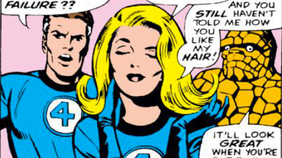A Finer Line Between Hero and Villain
- Mar 16, 2015
- 3 min read

Beginning now in earnest to read some of the early Marvel comics, I find it refreshing in how the heroes are more human than the DC heroes. Don’t get me wrong, I adore Wonder Woman, and I like Batman. While I never had much of an opinion on Superman, I must confess some of the more ridiculous moments in the early issues gave my roommate and I plenty to joke about. However, all the characters in the DCU are presented as paragons of righteousness or as essentially divine.
Marvel is not like that. Instead, Marvel takes a markedly different approach to superheroes when they make their resurgence in the ‘60’s. Instead of gods, these are mortal men and women who have problems and flaws like anyone else. Tough guy Ben “The Thing” Grimm and the know-it-all Mr. Fantastic bicker constantly, while Peter Parker acts like any cocky teenager would. The Hulk and the Thing are both down right monstrous. And while not read, special mention goes to the alcoholic and philandering Tony Stark/Iron Man.

That all of these people are able to rise to the occasion and become heroes makes them all the more remarkable. Superman just sort of decided to become a hero. Peter Parker made that decision after his own inaction caused the death of his uncle. Even compared with the tragic deaths of Batman’s family, the death of Peter’s uncle is perhaps more so because he will always be haunted with the fact that he could have saved him. These are heroes who learn and grow. They aren’t stagnantly perfect like their DC counterparts.
Furthermore, the Marvel villains are not so far removed from the heroes. Quite often parallels are made between heroes and villains. The dichotomy established between the Batman and the Joker is nowhere to be found here. Emphasis is instead placed on how being good or evil depends entirely upon one’s own choices.
For example, the Moleman in the first Fantastic Four story is not so dissimilar from the hero the Thing. The Moleman retreated underground because he was shunned because of his appearance. The Thing has a far more horrifying appearance than he does, but instead swore to help protect the world. It perhaps would have been easier for him to go the Moleman route, but instead he stuck to the path of good and became a superhero. Here, Stanley and Jack Kirby emphasize that heroics come from a force of will, an unwillingness to take the easy way out. They take the difficult path because they know it is the right thing to do.

Victor Von Doom perhaps exemplifies the extreme parallels between Marvel heroes and villains. In his origin story, Von Doom has all the makings of a hero. The son of a Romani healer and a sorcerous, he is intelligent and powerful. When his father is killed, he swears revenge and in doing so also takes pains to help better the lives of his fellow Romani. For me, these are things I would generally ascribe to a hero, rather than to a villain. However, Von Doom is remarkably vain and possesses a large stripe of hubris. It’s his own vanity and unwillingness to work with others that slots him squarely into the role of a villain. Believing himself to be better than others, he forces them to submit to his will.
Really, the biggest difference between hero and villain is in their choices, and in how much they allow their flaws to dictate their fates. Spider Man is an, oftentimes selfish, young man, yet he rises to the occasion and selflessly protects others at the cost of his finances and social life. The Thing exists in a world that views him as a monster, yet he gives it his all to protect it. The Fantastic Four all put aside their differences to work as a team. It’s only when someone doesn’t have the wherewithal to try to better themselves that they become the villain.



















Comments